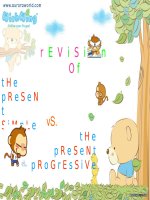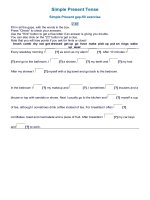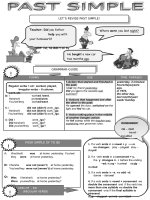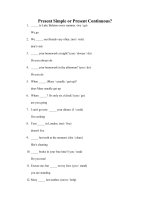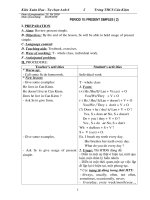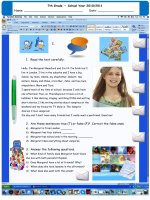present simple powerpoint presentation
Bạn đang xem bản rút gọn của tài liệu. Xem và tải ngay bản đầy đủ của tài liệu tại đây (236.66 KB, 13 trang )
PRESENT SIMPLE
swim
I swim everyday.
She swims everyday.
Now, it’s your turn :
Run
I run every day.
He runs everyday.
Verb : play the piano on Mondays
AFFIRMATIVE
I play the piano on Mondays.
FORM :
You play the piano on Mondays.
Subject +Verb
He plays the piano on Mondays.
We play the piano on Mondays.
You play the piano on Mondays.
They play the piano on Mondays.
He /she /it + Verb + S
I don’t swim everyday.
She doesn’t swim everyday.
Now, it’s your turn :
I don’t run everyday.
He doesn’t run everyday.
Verb : play the piano on Mondays
NEGATIVE
I don’t play the piano on Mondays.
FORM :
You don’t play the piano on Mondays.
Subject + DON’T + Verb
He doesn’t play the piano on Mondays.
We don’t play the piano on Mondays.
You don’t play the piano on Mondays.
They don’t play the piano on Mondays.
He /she /it + DOESN’T +
Verb
Do you swim everyday ?
Yes, I do. / No, I don’t.
Does she swim everyday?
Yes, she does. / No, she doesn’t.
Now, it’s your turn :
Do you run everyday ? Yes,
I do. / No, I don’t.
Does he run everyday?
Yes, he does. / No, he doesn’t.
Verb : play the piano on Mondays
INTERROGATIVE
Do I play the piano on Mondays?
FORM :
Do you play the piano on Mondays?
DO + subject + Verb +?
Does he play the piano on Mondays?
Do we play the piano on Mondays?
Do you play the piano on Mondays?
. Do they play the piano on Mondays?
DOES + he /she / it + Verb
+?
When do we use the present simple?
• To talk about things in general, to say that something
happens all the the time or repeatedly, or that something is
true in general.
Examples :
They usually go to London at weekends.
The Earth goes round the sun.
• To say how often we do things.
Example :
Mary often washes her car.
Spelling rules
• The ending is –es when the verb ends in –s/ -ss / -sh / -ch / -x / -o
Wash
Miss
Go
washes
misses
goes
• If a verb ends in a consonant + y (-by / -ry / -sy …) , « y »
changes to –ie before the ending « s »
Hurry
Try
hurries
tries
play plays
« a » isn’t a consonant, it’s a vowel !
Pronunciation
ã
The fnal ôsằ is pronounced /s/ when the verbs end with these
sounds : /p/ , /t/ ,/k/ ,/f/ and /θ/
She makes her bed.
He likes playing video games.
ã The fnal ôsằ is pronounced /z/ when the verbs end with these
sounds :/b/, /d/, /g/, /v/, /ð/, /l/, /m/, /n/ , /ŋ/,/eɪ/ and /a/
Tom plays football on Tuesdays.
She loves animals.
ã The fnal ôsằ is pronounced /iz/ when the verbs end with these
sounds : /s/, /z/, /ʃ/, /tʃ/ and /dʒ/
Mary watches T.V everyday.
Jerry often washes his car.


